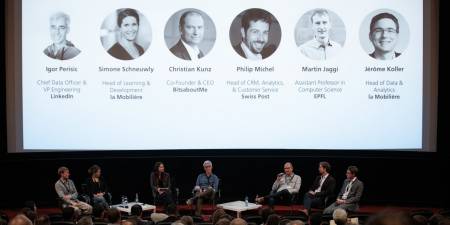Using data properly, interpreting it and processing it as a basis for decision-making: as digitization progresses, data literacy will become a core skill for companies. Igor Perisic, Chief Data Officer of LinkedIn, highlighted the importance of this discipline at an earlier event in a powerful statement on the subject: “Companies that are not processing data today and are unable to exploit it are doomed.”
You are here:
Four core ideas on the future of data
Data is priceless – provided companies know how to use it properly, that is. At the “Future of Data” event, there was a roundtable discussion with Igor Perisic, Chief Data Officer of LinkedIn, about what data will mean in the future for (Swiss) companies.

Delving deep into data
On 1 November, he was the leading participant at “The Future of Data”, a joint event run by PostFinance, Swiss Post and Swiss Mobiliar that was held at the CineBubenberg cinema in Berne. He discussed the subject of the “future of data” with Simone Schneuwly (Head of Learning and Development at Swiss Mobiliar), Philipp Michel (Head of CRM, Analytics & Customer Service at Swiss Post), Christian Kunz (CEO of the Berne-based data start-up bitsaboutme), Jérôme Koller (Head of Data & Analytics at Swiss Mobiliar) and Martin Jaggi (Assistant Professor in Computer Science at the Swiss Federal Institute of Technology in Lausanne). Here are the four core ideas to come out of a two-hour-long roundtable discussion on a huge subject:
Core idea 1: data must yield relevant stories
The fact we have been generating massive amounts of data for a long time is nothing new. What is new, however, is the fact that, thanks to modern data science, we are able to analyse this data and use it to create relevant stories for the company. Previously data science focused largely on the technological aspect. In future, though, it will become increasingly important to derive professional stories from the data, in other words to answer this question: what stories do we want to tell with this data in a professional context? Data is only useful if we can use it to tell stories that are important.
Core idea 2: data influences decisions, it is not the driving force behind them
Data should not drive companies into making decisions – it should just influence them. The decision as to whether you should go in one direction or another is always taken by one person or several. Data solely provides us with pointers.
Core idea 3: data use is not just about technology, it is above all else about ethics and fairness.
Ethics and fairness will play an increasingly significant role when it comes to using data. It is vital for all companies that handle data, and for every single one of us in general, to address the ethical aspect that data use involves. It is important to address the question of what data actually is, where you (can) store and use it, and to form an opinion on the matter. Data is too important for us to not know about it. What’s more, anyone handling the data of other people must be careful in the process, and accept responsibility for their own actions.
Core idea 4: companies will need to do a lot of data-related work
In a number of areas, companies are only in the early stages of data usage. They see a lot of potential and plenty of opportunities to use data sensibly, for instance to provide personalized content for training or brand new services. Yet to fully realize these ideas, they lack some of the technical capacity for one thing. For another thing, they need to hold discussions in house to determine what data ought to be accessed and used at all, and to what extent, and how they can guarantee transparency. This means longer processes, and will require a great deal of work.
About the event
This event was inspired by the The link will open in a new window white paper “The Future of Data”, which was compiled by a team of four involving PostFinance staff, Swiss Post and Swiss Mobiliar following their joint research trip to Silicon Valley. Over the course of the trip, they also met Igor Perisic, Chief Data Officer of LinkedIn.
